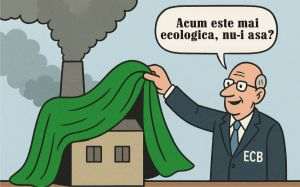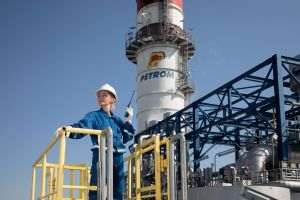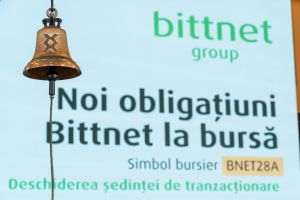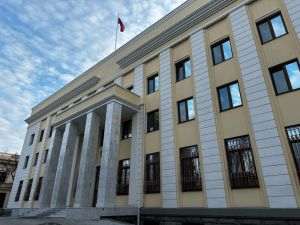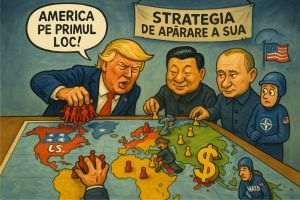Reporter: What is your opinion on the mining project of Roşia Montană?
Ionel Blănculescu: We are the only country in the world, not just in the European Union, that says "no" to mining. Recently, in Bulgaria a deposit of over 100 tons of gold was found, which is about one third of the one in Roşia Montană. The Bulgarians are extremely happy. Any normal authority, one of good faith, declares itself happy when it finds a deposit which can be mined.
Reporter: I don't think that the deposit in Bulgaria raises the problems of Roşia Montană, where there is a series of historical monuments - houses, Roman-Dacian tunnels, churches - protected by the law, many of them classified by the Ministry of Culture as class A (in other words of national importance). For instance, at Roşia Montană there have been discoveries of wax tablets bearing the ancient name of the settlement, Alburnus Maior, and many other Dacian-Roman artifacts.
Ionel Blănculescu: If Romania wants to become the country of underground gallerias, instead of becoming the country of investments, I have nothing against that. There may be about 2-3 tourists a year that visit the place. This would be the wrong way to go. Romania stubbornly opposes mining. Through ten government decisions over 550 mines and quarries have been shut down so far, over the last few years, and the authorities have allocated 185 million Euros for their shutdown, of which 143 million Euros came from foreign loans. A study drawn up in the US and Canada by Industrial Info Resources, the most important American mining consulting agency, shows that Canada is the world's leader in the mining industry. The foreign investors in Roşia Montană is Canadian. In 2012, 13 states and provinces in Canada and the US will open 211 projects of more than 50 billion Euros, to mine gold, platinum and silver. Countries with strong economies can't afford to neglect the mining sector, which they see as an opportunity for development and economic growth. This should apply for Romania as well.
Reporter: Are you a consultant for RMGC? Is the company paying you?
Ionel Blănculescu: I am not a consultant for RMGC, nor am I being paid, since I do not have any commercial relationship with them. I am however interested in any major Romanian investment project, not only in those in the gold sector. I am interested in the privatization of Cuprumin, in the hydroelectric plant of Târniţa, in the Groups 3 and 4 of Cernavodă and in about 70 major investment projects which the government has announced, as public-private partnerships. I began researching the Roşia Montană project two weeks after Traian Basescu expressed his support for it (at the end of August 2011- ed. note). Up until then I hadn't been that interested in the Roşia Montană project, I hadn't heard much about it.
Reporter: At one time, you mentioned the study which appeared on the website of Gabriel Resources of Canada, which shows the impact which the Roşia Montană project would have on the Romanian economy.
Ionel Blănculescu: Yes, but I have updated it. The authors of the study are world-renowned mining personalities. They analyze every major project. I met the officials of RMGC for my documentation, and I asked them how credible those experts were. I was told that the people behind the study are world personalities in the field, which is something that I verified and it was confirmed that indeed those people who made the study were indeed the top experts in their field.
Reporter: Did they provide the names of those experts?
Ionel Blănculescu: I am interested in numbers, not names. Based on their calculations, I modified two variables. The first variable was the value of the ounce of gold, which I changed from 900, like it was on their website (of RMGC or of the experts?), to 1,800 dollars. I have taken into account a royalty of 6%, instead of its current level of 4%, because there are talks about amending it. The 8% royalty rate, recently adopted, is like directly telling foreign investors to either stop coming to Romania, or send the ones who are already here packing. It is a rate which illustrates lack of reliability, immaturity and irresponsibility which is unheard of. That's how Romania likes it, being first when it comes to doing many types of stupid things. Anyway, if the Canadian somehow accepted this royalty rate, then the Romanian government would earn about a profit of about 60%, which to me seems "fair" for the party that isn't doing the hard work in this project, if this were communism, instead of capitalism, that is.
So it would be a good thing if the people in charge revised their attitude as to the approach of the royalty while there is still time, before that investor goes the way of Nokia, Tnuva or of other major investors who left Romania. If that happens, they could very well raise the royalty rate to 90%, the only difference being there would be no one left to pay it.
In 27 years, which is how long it is estimated that the Roşia Montană project will last (the construction of the processing plant will take 2 years; 16 years - the exploiting period; 9 years - the time to shut down, decommission and perform the ecological recovery of the land), the business will generate a net profit of 8.4 billion dollars, from the sale of the mined gold and silver. After paying the dividend tax, of 1.34 billion dollars, that would leave 7.1 billion dollars, of which the Romanian government would receive about 20% of the equity, that is 1.42 billion USD, and the Canadian partner, 5.68 billion dollars (80% of the capital).
From the Roşia Montană project, the Romanian government would earn a total of USD 5.39 billion, consisting of taxes, royalties, dividends, other fixed assets, and the Canadian partner would earn USD 5.79 billion, in the form of dividends. Through the multiplier effect (horizontal contributions to the economy, of 3.5 times on average, during the 27 years of operation of the project, especially during the first 18 years), the Romanian government would earn an additional USD 20 billion.
Essentially, out of this deal, the Romanian government would earn 56%, through taxes, dividends (almost 20%), plus the 6% royalty, meaning 900 million Euros. The royalty gains amount to almost 1 billion, which is almost the equivalent of the stake, of about 20%. It is as if we had an additional 20% of the business, in other words 40%, with the stake included. The rest to 56% are earnings from taxes.
Reporter: In you calculation you mentioned the multiplier effect, which would bring additional money to the budget. What are the businesses which are ancillary to the mining project of Roşia Montană?
Ionel Blănculescu: There are about 1,000 companies which will be involved in production. For example, RMGC is talking to ArcelorMittal Galaţi-Romania to get the latter to supply it with some special steel balls for the cylinders which will crush the ore. The problem is that Mittal can't supply the company with those steel balls before the Roşia Montană project begins. On the other hand, cyanide can be bought from the domestic market.
Right now, only about 13% of the domestic cyanide production is used in mining, and 57% is used in the metallurgic industry.
Reporter: Aside from the two aforementioned products needed for the production process, steel balls and cyanide, what other products are going to be involved in this deal? After all, there is talk about 1,000 companies which will be involved in the supply of the mining project of Roşia Montană, which will generate tax earnings.
Ionel Blănculescu: This figure of 1,000 companies comes from Mr. Ovidiu Nicolescu, who is, from my point of view, the father of management in Romania. He is the chairman of the Council of SMEs. He can tell you more about those companies. We are talking about transportation, of all types, (by land, by sea, by railway), industrial construction, engineering services, architecture, infrastructure, all the activities concerning the environment, recovery, recovery, cleanup, forest management and recovery, commercial activities, logistics insurance activities, all the activities pertaining to the operation of the plant for the separation of gold and silver, electrolysis, crushing, separation etc.
Just so you can picture what the horizontal development of an economic operation tied to a production center means, I can give you the example of Petrom: in 7 years of operation, with a horizontal multiplier factor smaller than the one of the Roşia Montană project, of 2.5 times compared to 3.5 times, 17,000 suppliers have developed, companies which in turn have employees, pay taxes, contribute to the state budget and to the nation's GDP. Over the course of those 7 years, Petrom went from a black hole that was losing 1 million dollars a month, to being the first taxpayer of the country, accounting for 11% of the total, paying 11 billion Euros to it and investing in Romania over 6 billion Euros. An outcome of 17 billion Euros in 7 years, for the Romanian government, perhaps to ensure the confidence in what they support, as well as in the Roşia Montană project, which might generate 6 billion dollars directly and 20 more billion dollars through the multiplier effect over the course of 27 years.
I want to tell you that one of the most vocal opponents of the Roşia Montană project, Monica Macovei, is no longer against it. Even though she claims that we should begin the project, she maintains that "We must do it by ourselves, for ourselves" and that we do not need the foreign investor. Even if we are discussing a utopia, the problem is that state owned companies are always bled dry, and they are rife with corruption, meaning that there is no way to create a business from which the government could profit. If the government created a public owned company to manage the gold of Roşia Montană, it would be the "clever guys" that would benefit. Just like it happened with Hidroelectrica.
Reporter: In keeping with this train of thought, we can say that the profit of the government, out of its association with the foreign investor in Roşia Montană, is comparable with the size of the Romanian underground economy. In fact, the untaxed economy amounts to about 30% of the GDP, that is 36 billion Euros, greater than the potential profit that the state could make from the Roşia Montană project, that you were talking about earlier.
Ionel Blănculescu: The money comes anyway. The Canadian makes that money and transfers it. What we do with it is a whole different matter. Right now we are simply tormenting the foreign investor.
Reporter: The government recently announced the doubling of the royalties for gold, platinum and silver, from 4% to 8% of the value of the output, and the increase of the royalty for the other mining products, such as coal and mineral water, from 4% to 6%. Do you think that the authorities may decide to renegotiate the contract with Gabriel Resources as well, so that Minvest, the minority shareholder, would have decision-making power when it comes to expenses? The opponents of the project say that the foreign investor makes excessive expenses, including those concerning advertising, which Minvest will also bear when the time to pay dividends comes. Why does the public need so much persuasion when it comes to this project, when it's the authorities who decide whether the project should be authorized or not? The opponents of the project claim that this is a way of forcing the business to start, or else have Minvest incur ever increasing debts.
Ionel Blănculescu: What contract are we talking about?! There is no contract between the two parties, just an exploitation license which belongs to the RMGC. The size of the shareholders' stakes is specified in the company's bylaws, of the Trade Registry. Those who are against the project actually talk about a contract that doesn't actually exist. The royalty is stipulated in the Tax Code.
As for the advertising, these actions are the result of the attitude that we have towards the foreign investors. We are tormenting them. We are forcing them to show us how beneficial it would be if we finally launched the project. I think that they are looking to garner support for the project. They want to raise awareness. It is the Romanian government that is forcing the investor to spend that money, because it refuses to issue the environmental agreement.
Reporter: There are voices that claim that this aggressive advertising campaign is actually a factor for pressuring the Romanian government, which continues to accrue debts towards the foreign investor.
Ionel Blănculescu: Yes. So what? In business we have the "pressure" factor, like it is called in economic terms. Marketing is an economic science. What is the investor supposed to do, neglect everything they learned in business school just to fit into the Romanian reality? Even though the company has operating licenses, it is delaying the implementation of the business plan because it isn't getting the environmental permit. RMGC has an operating license for 20 years, of which 10 years have already expired. We should be happy we're not getting sued in the international courts, which would lead to us being paid the equivalent amount of an IMF loan, for the way we treated the Canadian investor, after granting it a mining license. The investors in Gabriel Resources are three billionaires of the US and Israel, the most powerful in the gold, diamonds and other such sectors. We would probably see the final wave of withdrawals of what's left of the foreign investors in Romania, it would basically create the "Museum of foreign investors in Romania", where the pupils and tourists, Romanian tourists of course, coming in from Oltenia, Banat and Moldova, will be able to touch the artifacts of the last investors who had the courage to invest in Romania.
"I am not a consultant for RMGC, nor am I being paid, since I do not have any commercial relationship with them. I am however interested in any major project to invest in Romania, not only in the gold sector. I am interested in the privatization of Cuprumin, in the hydroelectric plant of Târniţa, in the Groups 3 and 4 of Cernavodă and in about 70 major investment projects which the government has announced, as being the object of public-private partnerships".
•
"The 8% royalty rate, recently adopted, is like directly telling foreign investors to either stop coming to Romania, or send the ones who are already here packing. It is a rate which illustrates lack of reliability, immaturity and irresponsibility which is unheard of. That's how Romania likes it, being first when it comes to doing many types of stupid things".
•
"Essentially, out of this deal, the Romanian government would earn 56%, through taxes, dividends (almost 20%), plus the 6% royalty, meaning 900 million Euros. The royalty gains amount to almost 1 billion, which is almost the equivalent of the stake, of about 20%. It is as if we had an additional 20% of the business, in other words 40%, with the stake included. The rest to 56% are earnings from taxes".

